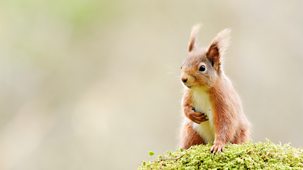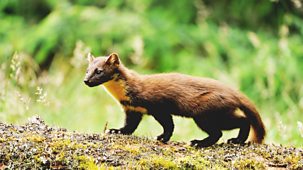
Series 1: Episode 2
More than 80 per cent of Scotland’s population live in the Lowlands, a vast swathe of the country stretching from Aberdeenshire in the north east to the border with England in the south. This is a landscape characterised by sprawling urban centres, huge areas of agricultural farmland, fragmented forests and mighty rivers. The Lowlands are the most intensely managed part of Scotland’s landscape. But wildlife still survives here, clinging on, and in some places a few species are beginning to stage a comeback.\n\nIn the heart of Edinburgh, the peregrine falcon now graces the sky on a daily basis. A pair have recently started raising a family here, just a few decades on from the cusp of extinction in Scotland and the UK. \n\nFurther out in the suburbs, we see other animals have also adapted to the urban environment. By the Water of Leith, a family of foxes have made a home, and we watch their tiny cubs starting to explore the world outside their den, learning the skills needed for independence.\n\nAcross the central belt in Glasgow lives a hardy collection of water voles - nowhere near water! They are the only population known to live in burrows in open grassland anywhere in the UK, and were only discovered here in 2008.\n \nFurther north lies the River Tay, journeying for over 100 miles from source to sea. As it passes the mighty Tay Reedbed, the river slows and widens dramatically. The reedbed stretches for miles along the north shore and is home to Scotland’s largest population of rare bearded tits, which only colonised here in the early 1990s.\n\nFurther upstream in Perth, Scotland’s first urban population of beavers can now be found. These industrious rodents have recently returned from extinction, after an absence of over 400 years. More than 1,000 of them can now be found throughout the Tay catchment, sometimes coming into conflict with farmers.\n\nThe Tay nears the end of its journey in Dundee, and out on the mudflats we witness huge numbers of wading birds gathering to forage. They race against the incoming tide in search of food, before setting off to look for somewhere quiet to rest and wait out high water.\n\nFurther inland lies one of Scotland’s great agriculture heartlands. Here, two special families of marsh harriers are nesting, both with a shared secret, and filmed for the very first time in Scotland.
Source: BBC 2
Most recent episodes of Scotland - The New Wild
Scotland - The New Wild
Series 1: Episode 3
The Highlands are a vast landscape covering much of Scotland. Dominated by mighty hills, glens, lochs, rivers and forests, it’s a landscape that has been heavily altered b ...
13-11-2024
BBC 2
Scotland - The New Wild
Series 1: Episode 2
More than 80 per cent of Scotland’s population live in the Lowlands, a vast swathe of the country stretching from Aberdeenshire in the north east to the border with Englan ...
07-11-2024
BBC 2
Scotland - The New Wild
Series 1: Episode 1
Nearly 800 islands lie off the coast of Scotland, and these are some of the most biodiverse places in the country where the mix of low intensity agriculture, wild spaces and a d ...
06-11-2024
BBC 2
Most popular episodes of Scotland - The New Wild
Scotland - The New Wild
Series 1: Episode 1
Nearly 800 islands lie off the coast of Scotland, and these are some of the most biodiverse places in the country where the mix of low intensity agriculture, wild spaces and a d ...
06-11-2024
BBC 2
Scotland - The New Wild
Series 1: Episode 2
More than 80 per cent of Scotland’s population live in the Lowlands, a vast swathe of the country stretching from Aberdeenshire in the north east to the border with Englan ...
07-11-2024
BBC 2
Scotland - The New Wild
Series 1: Episode 3
The Highlands are a vast landscape covering much of Scotland. Dominated by mighty hills, glens, lochs, rivers and forests, it’s a landscape that has been heavily altered b ...
13-11-2024
BBC 2



